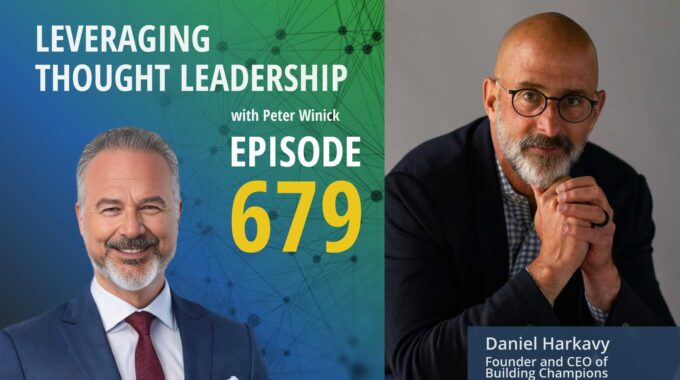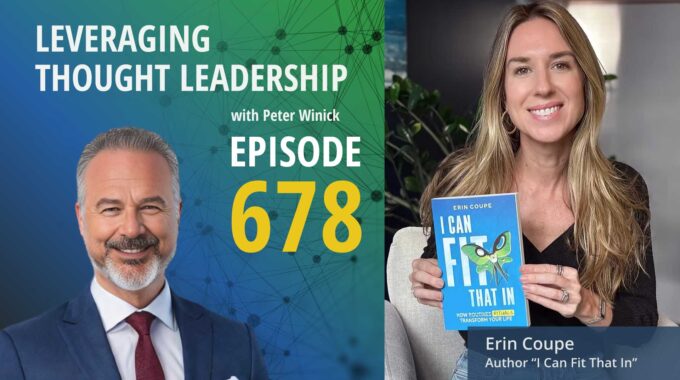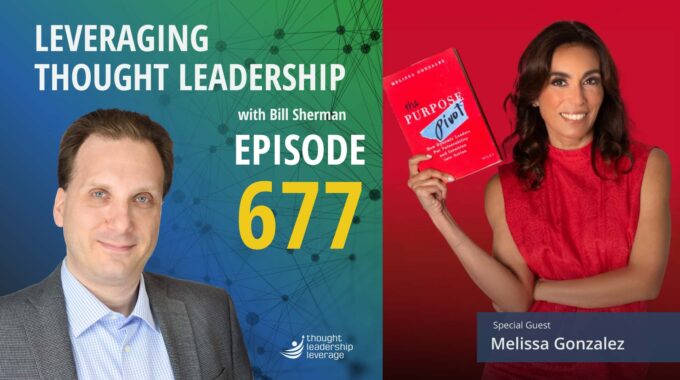A roadmap for leaders who want to multiply their impact — not their workload. This…
Leading Yourself: From Viral Articles to Empowering Workplaces | Elizabeth Lotardo
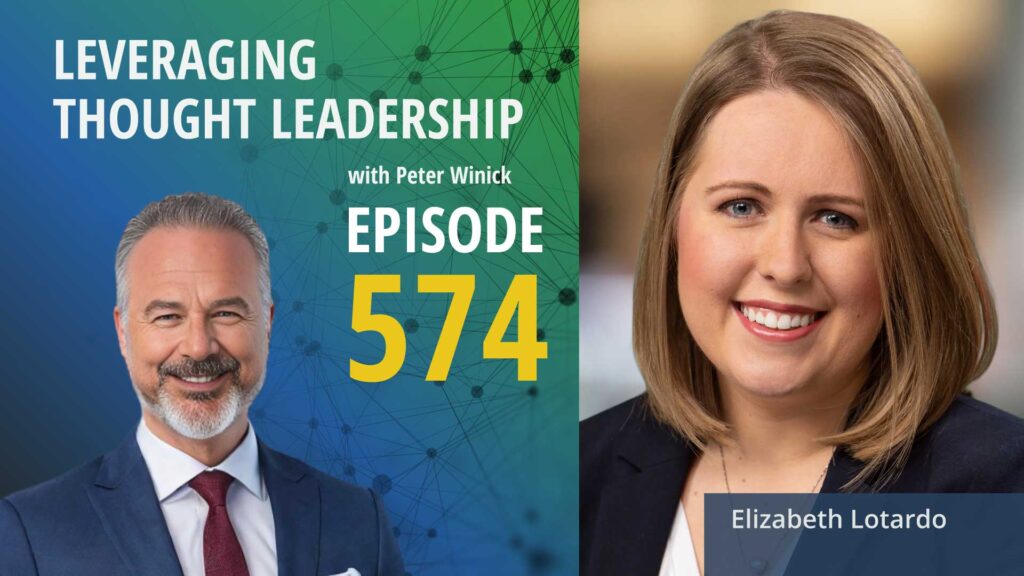
Navigating Virality, LinkedIn Learning, and the Power of a Positive Mindset
A conversation with Elizabeth Lotardo about Crafting Viral Content, Creating Courses, and Writing ‘Leading Yourself.
In this episode of Thought Leadership Leverage, host Peter Winick sits down with Elizabeth Lotardo, author of “Leading Yourself: Find More Joy, Meaning, and Opportunities in the Job You Already Have,” to explore her journey into thought leadership. Elizabeth, a consultant, Harvard Business Review contributor, and LinkedIn Learning instructor, shares her inspiring story and insights.
Elizabeth’s journey into thought leadership began with a powerful act of defiance. After quitting her job at an ad agency due to a toxic culture and lack of opportunity, she penned a raw and passionate article titled “Why Millennials Keep Dumping You. An Open Letter to Management.” This article went viral, resonating deeply with professionals who felt unheard and undervalued. Elizabeth and Peter delve into the nature of viral content and the power of authentic, heartfelt writing.
Going viral brought both support and criticism. Elizabeth discusses the mixed reactions and how she managed the rough comments alongside the positive feedback. This experience led her to write more on engagement from a Millennial perspective, eventually leading to her involvement with LinkedIn Learning.
Transitioning from writing articles to creating courses for LinkedIn Learning was a new challenge for Elizabeth. She shares how LinkedIn helped her transform her engaging writing style into actionable, educational content. The key was to maintain authenticity while adapting to the platform’s demands, focusing on engagement and retention.
Elizabeth’s upcoming book, “Leading Yourself,” is set to release in Fall 2024. It addresses how to find joy, meaning, and opportunity in less-than-perfect jobs. Drawing from her decade-long consulting experience, Elizabeth highlights how mindset, behaviors, and relationships can transform one’s work experience. Inspired by the success of her LinkedIn course during the COVID-19 pandemic, she realized the growing need for this topic.
In addition to her book, Elizabeth is developing a video version and corresponding training programs. These resources aim to help organizations instill the mindsets discussed in her book, empowering employees to create positive changes in their work environments.
Three Key Takeaways:
- Elizabeth’s viral article, “Why Millennials Keep Dumping You,” succeeded because of its genuine, passionate approach. Authenticity in thought leadership can resonate deeply with audiences and drive engagement.
- Transitioning from writing articles to creating courses for LinkedIn Learning required Elizabeth to adapt her writing style while maintaining authenticity. Thought leaders must recognize and play to the strengths of each medium they engage with.
- Elizabeth’s upcoming book, “Leading Yourself,” emphasizes the importance of mindset in finding joy, meaning, and opportunity in one’s job. A positive mindset can empower individuals to thrive in less-than-perfect work environments.
If you are interested in additional LinkedIn Learning courses, be sure to check out the content from Leveraging Thought Leadership.
Transcript
Peter Winick And welcome, welcome, welcome. This is Peter Winick. I’m the founder and CEO at Thought Leadership Leverage. And you’re joining us on the podcast today, which is leveraging thought leadership. Today my guest is Elizabeth Lotardo. Today, she has some really cool LinkedIn learning courses. She wrote an article that went viral, which is it’s always interesting to see when these things go viral. And it’s called Why Millennials Keep Dumping You, which was a top article on LinkedIn. She’s got one book in the can, she’s got another on its way. And she’s quite busy. So let’s just dive in. So how let me first of all thanks for coming on board today, Elizabeth. Appreciate it.
Elizabeth Lotardo You mean Peter I’m looking forward to this chat.
Peter Winick So how did this journey happen for you? How did this world of thought leadership occur? Or what were the choices you made, that or detours you made to get you here?
Elizabeth Lotardo So my journey into thought leadership began with an article, and it was an article I wrote when I was fuming, angry right after I had quit a job at an ad agency and I wrote the article your.
Peter Winick Your take this job and shove it article. Kind of.
Elizabeth Lotardo It was it was like the resignation I wanted to give. And that’s why I think it went so viral. I, of course, gave a really professional resignation at that job. I’m leaving for other opportunities. New York, great knowing you. Whatever or whatever. And then I wrote this article that was really in my heart of all the reasons that I actually wanted to quit, which were the culture was not good. I felt like I wasn’t being heard, I felt like I didn’t have opportunities and all of these things that drove me to changing my job. And what I saw was my friends were experiencing the same thing. So I wrote this article, Why Millennials Keep Dumping You an Open Letter to Management. And it went mega viral, for better or for worse thing or.
Peter Winick For a second. Because what I there’s a couple things here that I want to touch on that that are fascinating. So one is there’s sort of two camps with virality. There’s one camp of here’s the things to do to get things to go viral, which I don’t believe in. Right. It’s not a formula. It’s not if you post a 2:32 p.m. on a Tuesday or put in.
Elizabeth Lotardo I never had luck with that.
Peter Winick Yeah, I think that’s kind of nonsense. And I think as humans we don’t like that because we like to feel that we have control. And what I find is the things that go viral or, and, you know, we go viral is a relative term, right? It’s sometimes the stuff that we’re almost embarrassed to hit, publish on or send on. We just don’t know, like you did this, not to start a movement, like to get it off your chest and say out loud the things that you wanted.
Elizabeth Lotardo I, I did it in a little bit of rage. I was just like, you know why here? And I think that’s why it resonated so deeply, because so many people see through the lack of authenticity in these pieces. We trying make go viral. And what they pick up on is truth. And that was my truth that I shared in the piece. It was a truth that was shared by a lot of my friends, this brewing frustration of the working world and and to me, that’s why it landed. And if I did a lot of editing and gamification of the time and tried to load it with every single SEO word I could think of, that probably wouldn’t have been the case.
Peter Winick Right? And I think that’s, you know, hitting a zeitgeisty at a moment in time. Right? So you were saying out loud, in a very articulate way, things that lots of people were thinking and maybe, you know, didn’t go through the energy of putting it on paper. So this thing goes viral. And then what, as a result of all it’s different in your life?
Elizabeth Lotardo Well, and then I had to fight off anxiety for like weeks, right? Because it’s all over the internet. People, for better or worse, are commenting on this article and refreshing the comments constantly.
Peter Winick A step and step to Xanax. Is that.
Elizabeth Lotardo How this. Yeah, literally. Well, that would have been extraordinarily helpful in that, that period of my life. But so many of the comments were really positive. Like, this is exactly why I left the former job. This is what I was struggling for in my current job. A lot of the comments were also negative because it was a punchy article, and nothing that goes viral is unanimously accepted unless it’s some really cute cat video or something like that. Right? So I’m laying awake at night like, oh my gosh, has the internet thinks I understand them at this deep, heartfelt level? The other half thinks I’m an entitled rat, like what is going on? But eventually things simmer down and I decided to start writing about engagement, more specifically from an, talent like millennial talent. Let generational talent wins. And that’s how I got into LinkedIn learning, and I made my first course with them because of the success of this article on how to hire, engage, and retain top millennial talent. Okay, there was when the millennials were really hot. You know, we’re not anymore.
Peter Winick So stay there for a second because I think that there is this. Ancient myth, if you will, that in order to start your career as a thought leader, you’ve got to write a book. And I tell people all the time, I love books, I’m surrounded by books. I read a couple of books a week. I’m a big book writer. I have bookshelf envy looking at your screen, you know, over there you’ve got great books, but it’s not so. So what I love about what you did is you put this people out there with no agenda. It resonates. You listen to the market, right? You sort of said, I tapped into something. And then from there, there the next step was LinkedIn learning. Like now it could have been developer keynote. It could have been a workshop, it could have been 20 other things it didn’t have. Could be a book is the next step because that’s a really heavy lift. That’s like going straight marathon without the five K and.
Elizabeth Lotardo Really has to go from article to book is like married on your first day. Like, don’t get back to that right away.
Peter Winick So what did you learn from the process of converting your ideas, which really only kind of existed in this in this article? Now it’s structure format. How do I make that teachable? Tell us about what you learned becoming a LinkedIn learning instructor.
Elizabeth Lotardo LinkedIn was fantastic in helping me along this journey. I went in relatively clean. I didn’t have a lot of experience creating courses. Obviously, it’s very different than an article, and I really relied on them to help walk me through the formula. What stick? I know how to make people click and like and comment, but getting them to retain information and pass an assessment based on that course, it’s a really different way of writing. So I learned through then how to pull out these key actionable bits, how to point from thought to behavior, and a lot of other tips that made my writing become really actionable. And I tried hard and still tried hard to maintain the voice of, hey, I’m in this with you. We got this. This is frustrating, this is hard, and we’re going to do it together. And I think the marriage of those two things, a really authentic voice and a really hugely, you know, predominant focus on practicality is what makes a lot of my courses successful.
Peter Winick Right. So the modality though dictates the format and to some degree limits the style. Right. So yeah, by definition LinkedIn learning is of course right. So I’m a LinkedIn learning instructor. I’ve got a bunch of programs on there. The expectation of someone on the other side when I’m reading an article, the expectation might be, hey, this is interesting or not, if I make it through a paragraph or two, I can click next. If I’m committing to a LinkedIn learning course, whether I’m paying for it or not, the expectation is I’m investing some time and at the other side of taking this course, these are things I’m going to be aware of. I’m going to learn. I’m going to see the world differently. I’m going to be fluent in whether it’s a model, a method, a framework, a way of thinking, whatever the case may be, and to be able to format your thought leadership in such a way is a challenge, right? So I work with a lot of thought leaders where it’s easy for them to sit down and write and write and write and write and synthesize ideas and crunch the data. But that doesn’t necessarily play in, you know, it’s not a translation exercise of translated from German to English, a book that a campaign do. But what did you what did you learn and how did you what are the skills that you develop to say, to make an effective learning program, the following needs to be true for me. What did you learn?
Elizabeth Lotardo Interesting question. Well, in a partnership like LinkedIn learning and you know this as well as I do, they have some metrics on their side that you need to be working towards too. And that’s part of the deal of a partnership. They want to engage and retain learners. So if you’re making something that’s dragging on, you’re making something that’s tangential. Would you have the freedom to do it in an article that’s not going to fly in? And of course, especially a course that’s partnered with a brand like LinkedIn learning. So I think the challenge for content creators, and this is true even outside of LinkedIn learning, is playing to the medium as much as it is the message. So to your point, article and book very different things. People have different intentions when they’re clicking an article. All this might be saying maybe I’ll skim it versus of course, to your point, they want to learn something. They want to walk away with skills that they did not have prior to entering into that course. It’s different with a book, people will give you a little more leeway than they will an article. They’ll read through a little bit longer, but that chain. So I think having the ability to take what you’re passionate about and to take your authentic voice and apply it to different mediums is a huge, huge part of thought, leadership and recognizing not every medium is going to work for you. I do not like keynote because I don’t like it. I’m never going to be great at it. I love creating courses. I love writing books. It’s all about finding what fits.
Peter Winick So there’s two sides to that. I have a couple of thoughts there. One is I think that everybody’s got their default favorite and there’s no right or wrong. There are people that love to keynote. They can’t write. There are people who love to write that don’t want to get whatever. But I think you have to look at that two ways. Okay, what do I love doing and what am I really, really good at? And do I have an audience that resonates with that? Right. Because of some reason, the only way for you to reach your audience was to keynote. I mean, it’s unlikely you’d have to figure that out or you’re not going to hit the market. Right.
Peter Winick If you’re enjoying this episode of Leveraging Thought Leadership, please make sure to subscribe. If you’d like to help spread the word about our podcast, please leave a five-star review at ratethispodcast.com/ltl and share it with your friends. We’re available on Apple Podcasts and on all major listening apps as well as at thoughtleadershipleverage.com/podcast.
Peter Winick And I want to segue into you know, so you have to move into LinkedIn learning. You sort of develop those chops, have a good partnership with them. How did the book idea happen? How did that path happen?
Elizabeth Lotardo So my new book coming out this fall is called Leading Yourself. It’s how to create more meaning, joy, and opportunities inside an imperfect job. So if your boss kind of sucks, if your industry is a little behind, if the culture isn’t great, you don’t really love what you’re doing. You can still create a great work experience for yourself with no one else and help just you. That’s the premise of the book.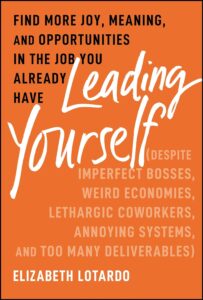
Peter Winick And so I just I want to understand the premise. Premise, you know, because there’s really a couple ways to think about it. Oh my God, I have no control. I’m a junior person. The culture here is terrible. This, you know, so this is within the agency that you have and everybody has some degree of agency. What can you do. Right. That’s kind of the gist of it. So that’s kind of cool. I guess what I’m trying to get is how did you come to the point that this is the thing to write the book about, right? You didn’t just do this in isolation and do the Walden Pond thing.
Elizabeth Lotardo But not do this. I do not have time for a Walden Pond experience in my life. So I’ll tell you the avenues that led me to create the book Leading Yourself. And I always need, for me at least, more than one kind of push in that direction just to verify it. So one, I was really passionate about this topic. I’ve seen it through my consulting practice for over a decade. The people who in a junior role throw their hands up. There’s nothing I can do, you know, everything is terrible. Line boss sucks, whatever it is. And the people who are like, you know what? These circumstances aren’t perfect, but I’m gonna make it work for me. Whatever that means for them. I see the difference in how it plays out in their careers to how that a mindset, that.
Peter Winick Difference is that sort of this victim mentality, this mindset mentality. Like, what is that a mindset?
Elizabeth Lotardo A lot of it is mindset. Some of it is behavior, some of it is relationship based. I dive into all three of those elements and leading yourself, but the biggest one is mindset. You’re your own worst enemy in that case. So I’ve been seeing this trend play out all along. This last decade or so. I also experienced it myself. I wrote that article that first got me into thought leadership from a place of disempowerment, of this sucks. I’m upset. There’s nothing I can do. Besides that. My feelings on the internet, which is something millions of people fall into. And over time I started to develop myself. The ability to work better in imperfect circumstances, to finesse my situation a little bit, to control my own mindset and let things go. The third factor that catapulted me into actually writing the book was data behind LinkedIn learning. Right, I started LinkedIn. Learning with a course on millennial talent retention. I went on to develop 20 plus courses with them, one of which was the very first version of Leading Yourself. And that course initially launched in 2017. And during Covid, I saw the data behind it go up up up up up up up up up up up up up. Because people weren’t right next to their bosses. They were feeling left in, enmeshed in their organizations a little bit more on an island. And their interest in self leadership started.
Peter Winick To stay there. Because I love the data piece. You have 20 courses, and it doesn’t necessarily mean that the one that is in 20th place from a data standpoint on LinkedIn is the worst one. And that, you know, the top one’s the first one. Sometimes it’s an indication of things that are going on outside of our control. Like you said, as Covid hit, it changed the demand and what people were looking for. So I love the fact that, you know, it’s an experiment, right. And then you went then you, you, you validated via data to yourself and your publishing. Like there’s a thing here of all the things that I write about and even all the things that you can speak and write about, there’s still within a narrow scope, right? You’re not writing, making courses, and knitting like you’re still in that zone. This is the framework. So I love that. It’s a way to increase the probability of success of the book. How do we know that people want the book? Well, if they’d like it in a learning program, a book is not just an extended version that, but it’s a much deeper version.
Elizabeth Lotardo Proof point.
Peter Winick Of that.
Elizabeth Lotardo Yeah. And the thing is, everyone has access to that data. Even if you’re not looking at LinkedIn, learning data, even if you don’t have a course library with how many viewers you have access to your LinkedIn post analytics, how many people are getting traction on certain posts? You have access to your own website analytics. What blog posts are really hitting? You have access to even anecdotal information. What have you gotten a lot of replies to your newsletter about people saying, oh, this really hit with me. So to me, deciding to write a book is part passion. You know, I’ve been on this journey myself, part observation. I’m seeing it play out with all these people and part data. The numbers prove that this concept is landing, and that is a reason to invest more research power behind it for me.
Peter Winick Well, I love this sweet spot of the data. Backs it up. But you’re in essence, you know, ground zero, right? You’re eating your own dog food. And, you know, there are people that are in the thought leadership space. They don’t say, I’d never write a self-help book, but this book helped myself, right? Help me write like I, I am, you know, client number one. And I think you can’t fake that, right? Like, you know, there are certain things, you know, agile software, whatever that, you know, processes, methodologies, frameworks, whatever that we might embrace and enjoy. But part of this is, I would imagine in the book, there would be more anecdotes, more stories, more emotion, as well as the facts there. Right?
Elizabeth Lotardo And that’s what makes it interesting to read. And it also prevents you from being this like sage on the stage. You know what I mean? Where you’re not like, I’ve always had every single answer. I have never had a problem. And that’s why you should listen to me. I take the opposite approach. My listen, I have wasted so much time complaining about other people, other situations, and not enough time empowering myself to own the parts that I can. And the journey that I went on is the journey of this book. It’s a journey that a lot of my peers have been on, and it’s a journey I’ve seen play out in my consulting practice. And here are the tips that can maybe save you a few years of disgruntled ness.
Peter Winick Love it, love it. So it’ll be interesting to see where that goes. So what do you see? What’s next? I mean, obviously.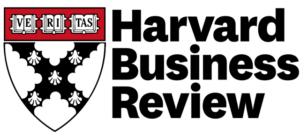
Elizabeth Lotardo The book I hear the government has admitted aliens are real, so who knows?
Peter Winick Oh, okay. Well that will to be continued.
Elizabeth Lotardo Dig into that later. What’s next for me in regards to leading yourself in the book, then launching Leading Yourself comes out in August. I also have a video book to accompany that, so everyone who purchases the actual book also gets the video book. So if you’re thinking like, oh, that sounds interesting, I don’t know if I got a whole book in me. I’m busy. I don’t really love to read your video book. Totally your style. And then I’ve developed some training programs along with that. So I’ll be working with my clients on how to instill this mindset of self-leadership in the front lines of their organizations. And from there, we’ll see what reveals itself as my next play.
Peter Winick That’s fantastic. Well, thanks for coming on board. I love the journey and I love sort of sort of the accidental thought leader, because I’ve seen lots of sort of accidental fall leaders, you know, but you listen to it, right? This thing happened and then you listen to it. And I think, you know, the kind of the moral of this story is, put it out there like, you never know if you if you’re troubled about something, you’re guess what? You’re probably not that special. There might be many, many others, and you might if you do it well, you could sort of tap into something that could take you down a whole different path, like your career would have been in a whole different place had you not had the courage to put that out there. Cause it’s probably scary to put it out there.
Elizabeth Lotardo And degree, and I think that was overridden in a moment by just annoyance at the world. But what I would say is that and thought leaders, so often it’s tempting to self edit and to strip away that authentic voice, make sure it’s so clear, so loaded with SEO words, not a missing element of it. And the internet, especially with the development of AI in the last couple of years, is full of bland garbage and rewards. Year old right? Right to your own voice. Make something different, make something punchy. And even if it pisses off 20% of people, you’re better off because 80% of people are going to like it.
Peter Winick Well, I think that pisses off them is great from with an asterisk. Right. So the other thing that I think that you did that was wise is, you know what the first article that you wrote wasn’t vicious or trashing people or, you know, whatever. It’s up. I mean, you had said it’s up there forever and you did it with integrity. You did it with authenticity. You did it professionally and still made the case. I mean, there could have been there might have been private texts that you sent to dear friends that were getting.
Elizabeth Lotardo Name names on the internet, but they’re still living in my brain. But I spoke to it in authentic way that was still professional. To your point, I did just write some rambling, terrible Yelp review and expect to be viral. It happy takeaways and some themes.
Peter Winick Yeah, because I think people confuse authenticity with not just vulgarity, but you know, pointless. Like you’re venting for the sake of venting. Yes, that person’s a jerk. Like you don’t need to say it ten times, but like, what about the situation can be extracted to, you know, so others can make it relatable? Not boo hoo, poor me. You know, get over yourself. Whatever. So anyway, it’s has been fantastic. Appreciate your time. Appreciate your, your, sharing with us. And I wish you the best when the book comes out.
Elizabeth Lotardo Thanks for having me. Peter, always such a pleasure to talk with you, and I know so many listeners in your community have such great thought leadership that they want to see out there.
Peter Winick Thank you. To learn more about Fall Leadership Leverage, please visit our website at Thought Leadership
Peter Winick To learn more about Thought Leadership Leverage, please visit our website at ThoughtLeadershipLeverage.com to reach me directly. Feel free to email me at Peter at ThoughtLeadershipLeverage.com, and please subscribe to Leveraging Thought Leadership on iTunes or your favorite podcast app to get your weekly episode automatically.


